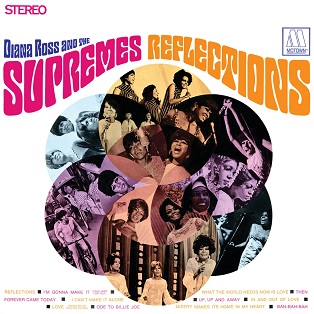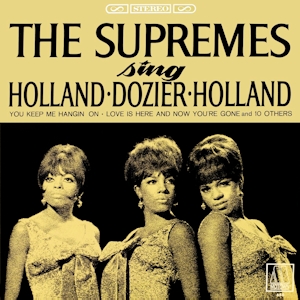Related Research Articles

"I Hear a Symphony" is a 1965 song recorded by the Supremes for the Motown label.

The Supremes A' Go-Go is the ninth studio album released by Motown singing group the Supremes. It was the first album by an all-female group to reach number-one on the Billboard 200 album charts in the United States.

The Supremes is a 2000 box set compilation of the material by Motown's most popular act of the 1960s, The Supremes. The set covers The Supremes' entire recording history, from its first recordings as The Primettes in 1960 to its final recordings in 1976.

Reflections is the twelfth studio album recorded for Motown by Diana Ross & the Supremes. Released in 1968, it was the first regular studio LP to display the new billing of the group formerly known as "The Supremes." It contains the singles "Reflections", "In and Out of Love" and "Forever Came Today". Also included are covers of songs made famous by Martha and the Vandellas and The 5th Dimension. Also present are songs written by other famous names, including "Bah-Bah-Bah" co-written by Motown singer Brenda Holloway with her younger sister, Patrice, an original Smokey Robinson composition titled "Then", and "What the World Needs Now Is Love" by Burt Bacharach and Hal David, which Motown planned to release as a single in the spring of 1968, but cancelled. It also contains a cover of Bobbie Gentry's "Ode to Billie Joe," whose original recording kept the single #2 "Reflections" from peaking at the top spot on the Billboard Hot 100 in September 1967, and it hit #2 on Cashbox.

The Supremes Sing Holland–Dozier–Holland is the tenth studio album released by The Supremes for Motown in 1967. It includes the number-one hit singles "You Keep Me Hangin' On" and "Love Is Here and Now You're Gone". As the title states: all songs on the album were written and produced by Motown's main songwriting team of Holland–Dozier–Holland. Most of the album was recorded during the spring and summer of 1966; however several songs date back to the summer of 1964.

More Hits by The Supremes is the sixth studio album by Motown singing group the Supremes, released in 1965. The album includes two number-one hits: "Stop! In the Name of Love" and "Back in My Arms Again", as well as the Top 20 single "Nothing but Heartaches".

Meet the Supremes is the debut studio album by The Supremes, released in late 1962 on Motown.

I Hear a Symphony is the eighth studio album released by American girl group the Supremes on the Motown label in 1966.

The Supremes at the Copa is a live album by Motown singing group the Supremes, recorded during their debut engagement at the prestigious Copacabana nightclub in New York City. Released in the late fall of 1965, At the Copa was the first live album issued by the Supremes, and the only live album issued by the group's best-known lineup of Diana Ross, Florence Ballard and Mary Wilson.

Diana Ross & the Supremes: Greatest Hits is a two-LP collection of singles and b-sides recorded by The Supremes, released by Motown in August 1967. The collection was the first LP to credit the group under the new billing Diana Ross & the Supremes. Although founding member Florence Ballard is pictured on all album artwork and sings on all the tracks, by the time the set was released, she had been fired from the group and replaced by Cindy Birdsong.

Anthology, also known as Anthology: The Best of The Supremes, first released in May 1974, is a series of same or similarly titled compilation albums by The Supremes. Motown released revised versions in 1986, 1995 and 2001. In its initial version, a 35-track triple record collection of hits and rare material, the album charted at No. 24 on Billboard's "Black Albums" and No. 66 on "Pop Albums".
"Let Me Go the Right Way" is a 1962 song written and produced by then Motown president Berry Gordy and released as a single by Motown singing group The Supremes. It was the group's fourth single and their second charted record following the dismal reception of their first charted single, "Your Heart Belongs to Me".
"A Breathtaking Guy" is a 1963 song written and produced by Smokey Robinson and released first by Motown singing group The Supremes (1963) and later by The Marvelettes (1972). The single was originally released under the title "A Breath Taking, First Sight Soul Shaking, One Night Love Making, Next Day Heartbreaking Guy" by The Supremes, but was shortened after its official release. All three Supremes members - Diana Ross, Florence Ballard and Mary Wilson - sang the chorus with the original title together.

"When the Lovelight Starts Shining Through His Eyes" is a song written by Holland–Dozier–Holland and recorded in 1963 by Motown singing group The Supremes. It is notable as the Supremes' first Billboard Hot 100 Top 40 recording, following seven previous singles between January 1961 and September 1963 which failed to enter the Top 40. The single is also notable as the first Supremes single written and produced by Holland–Dozier–Holland, who had previously created hits for Martha and the Vandellas and Mary Wells.

"Nothing but Heartaches" is a 1965 song recorded by The Supremes for the Motown label.

"In and Out of Love" is a 1967 song recorded by The Supremes for the Motown label. It was the second single issued with the group's new billing of Diana Ross & the Supremes, the penultimate Supremes single written and produced by Motown production team Holland–Dozier–Holland, and the last single to feature the vocals of original member Florence Ballard.

"Whisper You Love Me Boy" is a song written and composed by Holland–Dozier–Holland and recorded by at least three Motown female acts: early Motown star Mary Wells, popular Motown singing group The Supremes and blue-eyed soul Motown label mate Chris Clark in 1964, 1965 and 1967 respectively.
"Put Yourself in My Place" is a song written by the Motown team of Holland–Dozier–Holland and recorded by at least four Motown recording acts during the sixties: The Elgins in 1965, The Supremes, Chris Clark and The Isley Brothers in 1966.
"Going Down For the Third Time" is a song written and composed by Holland–Dozier–Holland, and recorded by Motown singing group The Supremes in 1967. The song was issued as the b-side to the popular "Reflections".
"Too Hurt to Cry, Too Much in Love to Say Goodbye" is a 1963 song and single written and composed by Motown's main production team Holland–Dozier–Holland. Credited to the Darnells, the performers on both sides of the single were the Andantes, Holland–Dozier–Holland, Mary Wilson of the Supremes (B-side), and members of the Marvelettes, the Four Tops, and the Temptations. Nobody involved with the production on either side was pleased with the false credit. The single peaked at number 17 on the Billboard Bubbling Under Hot 100 chart.
References
- ↑ "www.allmusic.com". allmusic.com. Retrieved July 5, 2023.
- ↑ "The Supremes - Mother Dear [Dean Martin Special - 1965]". YouTube .
- ↑ "Diana Ross & the Supremes - the Red Skelton Show [1/27/66]". YouTube .
- The Complete Motown Singles Vol. 5: 1965 [CD liner notes]. New York: Hip-O Select/Motown/Universal Records.
- Ribowsky, Mark. "The Supremes: A Saga of Motown Dreams, Success, and Betrayal". New York: Da Capo Press, 2009.